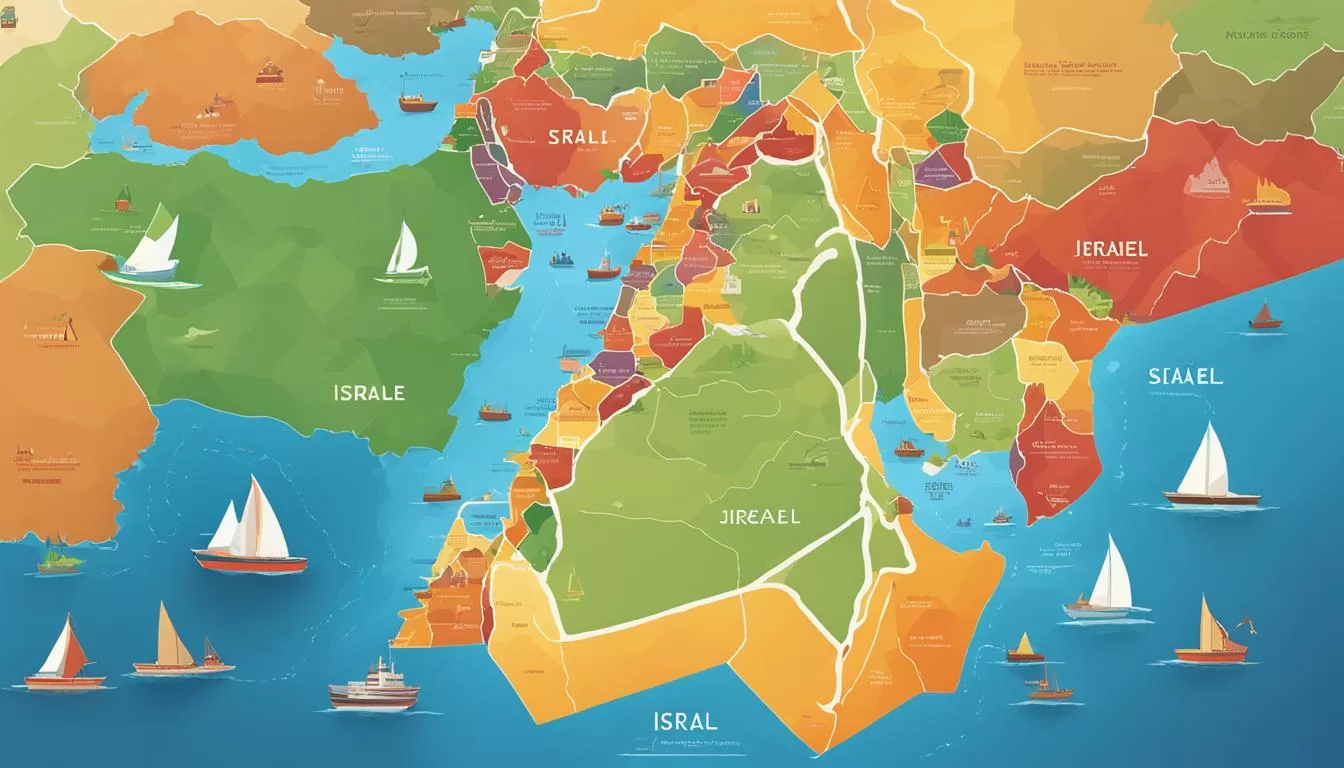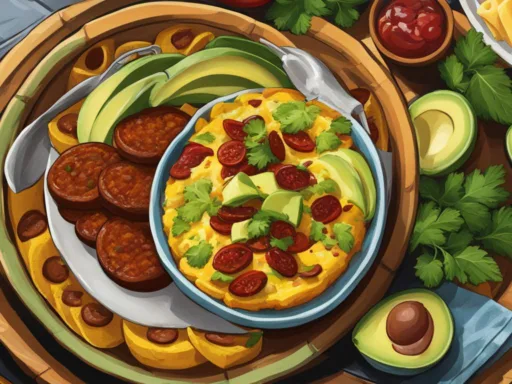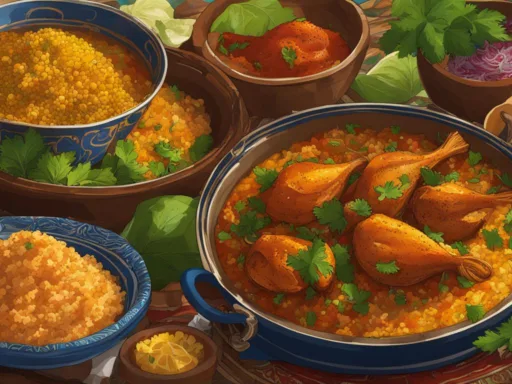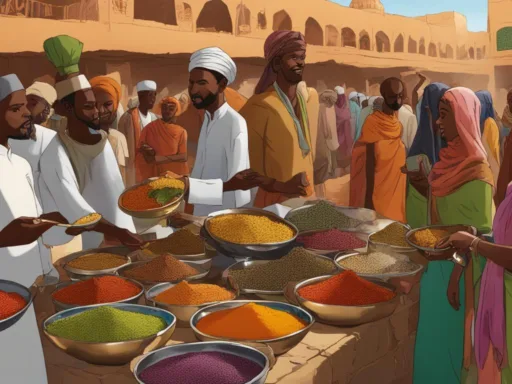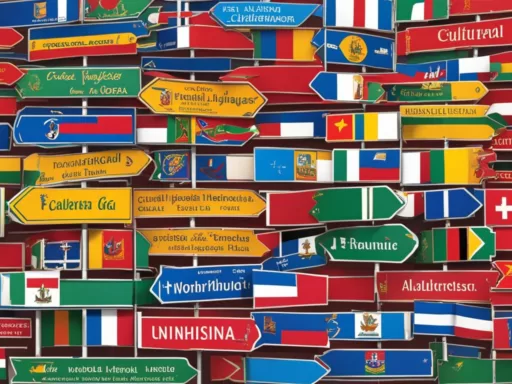The tapestry of languages spoken in Israel is as variegated as its history and peoples. From the bustling markets of Jerusalem to the tech hubs of Tel Aviv, a cacophony of languages fills the air, indicative of the country’s rich cultural canvas. At the core of the official languages Israel offers are Hebrew and Arabic, each woven intricately into the nation’s identity. Hebrew, with its ancient roots and modern ubiquity, serves as the linguistic backbone for most citizens, while Arabic marks the narratives of the Arab minority, resonating with its own historical depth.
But the linguistic landscape does not end there; Russian, a testament to the profound impact of immigration, adds to the chorus with its robust presence. English follows suit, serving as a global bridge and an essential tool in business and education. The presence of Spanish, Amharic, Yiddish, and French further enrich the palette, each adding unique hues to the linguistic mosaic of this Middle Eastern democracy. These languages spoken Israel not only facilitate communication but collectively narrate the story of a nation that embraces diversity at every turn.
Key Takeaways
- Hebrew and Arabic are the official languages of Israel, integral to its social and political tapestry.
- English, although not official, is prevalently used and understood, enhancing Israel’s global connectivity.
- Russian’s prominence reflects the significant history of Jewish immigration from the former Soviet Union.
- A mosaic of languages such as Spanish, Amharic, Yiddish, and French contributes to Israel’s multicultural society.
- The linguistic diversity in Israel mirrors the country’s rich cultural history and demographic variety.
Unraveling the Linguistic Tapestry of Israel
The revival and dominance of Hebrew, the unique status afforded to Arabic, and the widespread command of English illuminate the rich linguistic canvas of Israel. As we peel back the layers, the languages of Israel recount a fascinating narrative of cultural revival, legal status, and social integration, reflecting upon the nation’s vibrant history and its modern identity. Let’s delve into the heartbeats of this linguistic mosaic.
Hebrew: The Revival of an Ancient Tongue
Embodying the spirit of the Hebrew revival, Modern Hebrew’s transition from an ancient liturgical language to the vernacular symbolizes the perseverance and inventiveness of the Israeli people. This resurrection is largely credited to Eliezer Ben-Yehuda, a key figure behind the language’s rebirth, and the fervent Zionists of the Second Aliyah. Modern Hebrew is now the core of Hebrew proficiency and functions as the main medium for communication, underpinned by organizations like the Academy of the Hebrew Language, ensuring its evolution and uniformity.
Arabic’s Special Status in the Israeli Mosaic
Arabic holds a distinctive place in Israel’s linguistic landscape, where its official status under Israeli law manifests in both personal and public spheres. The Arabic language is an essential form of expression for Israel’s Arab minority, and though Hebrew is prominent, the government’s bilingual signage reflects a broader cultural acknowledgment. The Supreme Court has further influenced the ever-expanding use of Arabic, advocating for its integration beyond communities and into the nation’s fabric as a whole.
The Prominence of English in Israeli Society
Within this multilingual nation, English emerges as a key agent for global engagement. English proficiency in Israel surpasses the confines of academia and international commerce, resonating with a significant portion of the populace. Instructional systems prioritize English, positioning it as an instrumental language for Israelis from all walks of life. This widespread use of English, complemented by bilingual road signs and official logos, signifies Israel’s adaptive and forward-looking communication avenues in a connected world.
The Historical Footprint of Languages in Israel
The emergence of the State of Israel carried with it not only a new political reality but also a linguistic awakening that has left deep imprints on the region’s cultural fabric. The historical journey of language enforcement and policy in Israel provides a window into the enduring struggle to define national identity and heritage. Within this context, the Zionist movement played a pivotal role in elevating Hebrew to its current prominence, intertwining the process of state-building with the intricate tapestry of language revitalization.
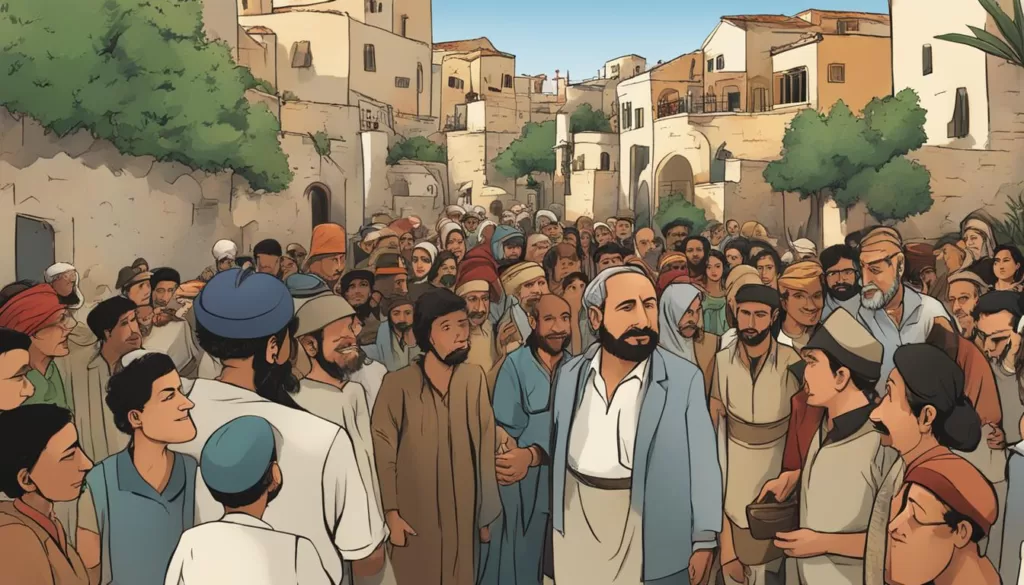
From the British Mandate to Modern-Day Israel
The end of Ottoman rule and the onset of the British Mandate was a period of significant linguistic transformation. Following the Balfour Declaration and subsequent developments, the Zionist movement eyed the reestablishment of Hebrew as an official language—a dream that materialized in the years leading up to Israel’s declaration of independence. This epoch marked the initial steps toward a cohesive language policy in Israel, one that would harness the burgeoning sense of Jewish nationalism.
Languages of Immigration: Shaping Israel’s Linguistic Landscape
Immigration has been a cornerstone of Israel’s demographic growth, influencing its linguistic dynamics extensively. Notably, the Second Aliyah brought with it a contingent of activists and visionaries committed to the revival of Hebrew. They would lay the groundwork for future waves of immigrants to adopt Hebrew, culminating in a sweeping language policy that emphasized Hebrew’s superiority over other Jewish languages. Nonetheless, these immigrant populations also imported a rich diversity of tongues, challenging the state’s language enforcement even as it solidified Hebrew’s role in public life.
| Immigration Wave | Impact on Hebrew Revival | Contribution to Linguistic Diversity |
|---|---|---|
| Second Aliyah (1905–1914) | Fueled the Zionist emphasis on Hebrew as a unifying language | Introduced Eastern European linguistic influences |
| Post-WWII Immigration | Expanded the population of Hebrew speakers, reinforced Hebrew education | Brought numerous European languages, consolidating a polyglot society |
| Immigration from Soviet Union (1970s-1990s) | Further reinforced Hebrew while accommodating a sizable demographic | Added Russian to the pantheon of major languages in Israel |
Over time, Israel has continued to navigate its complex linguistic heritage while embracing the many tongues of its immigrant communities. This delicate balancing act reflects the nation’s broader struggles and successes in forging a singular Israeli identity from a tapestry of disparate cultures and histories.
Hebrew: The Beat of Israel’s Heart
In the heart of Israeli society, pulsating to the rhythm of everyday life, is the Hebrew language. Integral to the nation’s ethos, Hebrew serves as more than just a means of communication—it is the cornerstone of cultural identity for Israeli Jews who typically are its native speakers. The resonance of Hebrew is heard in the halls of education, within the chambers of government, and echoes throughout the country’s legal and media landscapes. Unifying a nation of diverse origins, Hebrew’s modern standardized form is the bridge that connects its speakers, transcending dialects and histories.
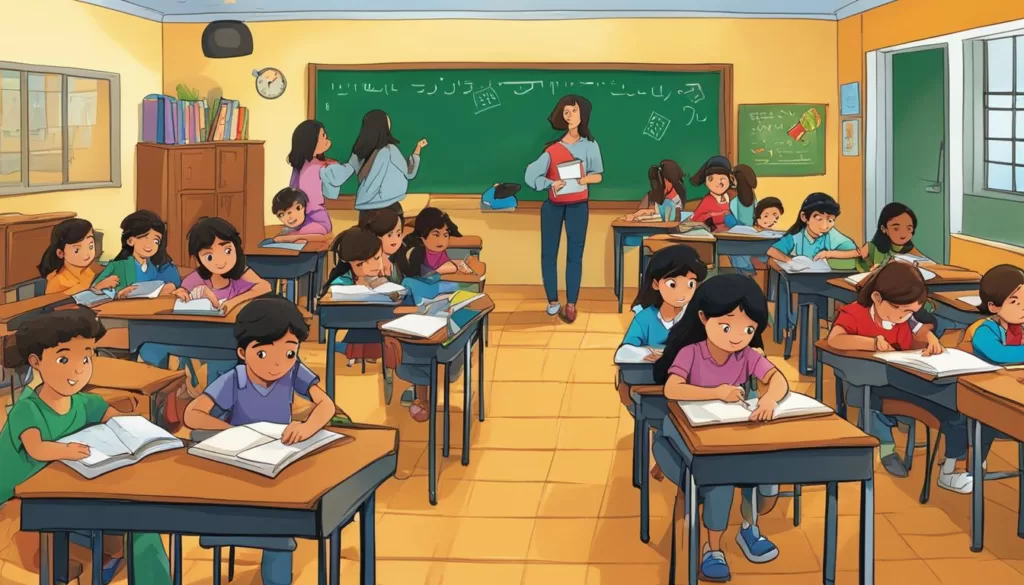
The emphasis on the Hebrew language within the education system is evident, where it’s a staple from the youngest classrooms to the institutions of higher learning—Hebrew speaking schools are pivotal in shaping the future of the nation. This fervor for the Hebrew tongue extends to Israeli Arabs and immigrants who, through diligence and study, often attain fluency. Initiatives such as introducing Hebrew in Arab schools from the early years and mandatory Hebrew exams during matriculation exams exemplify its embedded status in Israel’s educational framework.
Hebrew language proficiency is widely regarded as a necessary skill for full participation in Israeli society. Whether in bustling markets of Jerusalem or the innovation-driven streets of Tel Aviv, Hebrew is the lexicon of daily life. Yet, within this linguistic affinity, there are variances reflective of the individuals who speak the language—variances that demonstrate the intricate blend of Israel’s societal fabric.
The unifying force of Hebrew within Israel cannot be overstated—it is not only a language but also a testament to the nation’s resolve to foster a cohesive identity. Inextricably linked to both the ancient past and the dynamic present, Hebrew continues to evolve, pulsating with energy as the living, breathing beat of Israel’s heart.
Languages Spoken Israel: Beyond the Official Titles
The linguistic narrative of Israel is painted with broader strokes than just Hebrew and Arabic. As we move beyond the official languages, the prominence of Russian and English, as well as a variety of other tongues, enriches the cultural dialogue and adds depth to the country’s identity as a multicultural society.
Understanding the Vital Role of Russian in Israel
With approximately 20% of Israel’s population comprising Russian speakers, the impact of the former Soviet Union’s Jews is palpable. The echoes of Russian are not confined to conversations on the streets; they reverberate through Russian TV channels and other Russian media in Israel, serving both as a connection to heritage and a bridge to current events. These outlets provide entertainment and news to a significant demographic, maintaining their cultural ties and informing their views.
The Visible Influence of English on Israeli Culture
English’s role in Israel goes beyond its function as a second language. In the spheres of government and enterprise, it often takes center stage, testifying to Israel’s position within the global arena. From startups to multinational corporations and diplomatic exchanges, English facilitates communication and unlocks doors to international opportunities. As a result, English proficiency is a cornerstone of the educational system, propelling Israel’s global participation forward.
Other Languages that Enrich Israel’s Diversity
Israel’s social tapestry is intricately embroidered with threads from all over the world. Languages such as Amharic and Spanish are spoken due to waves of immigration and language exchange programs. These linguistic threads have been woven into Israel’s framework through cultural exchanges, exemplifying the nation’s openness to a multicultural society. Each language carries with it a multitude of stories, traditions, and perspectives, contributing to the vibrant patchwork that is Israeli life.
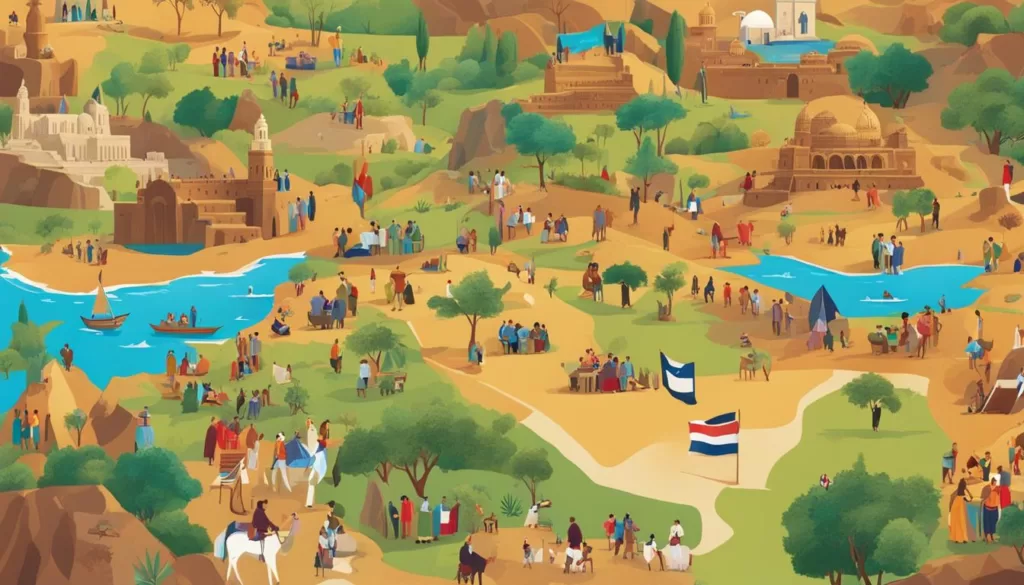
As Israel continues to evolve, so does its linguistic landscape, ever adapting to the changing needs and rich language diversity of its people. In its essence, the multitude of languages spoken Israel stands as a testament to the inclusivity and adaptability of this dynamic nation.
Arabic in Israel: A Language of Many Dialects
The tapestry of the Arabic language in Israel is as intricate and diverse as the cultural heritage of its speakers. With various dialects each carrying years of history and tradition, Arabic is a lifeblood for the Arab citizens of Israel, providing a linguistic connection to their ancestors and communities. It’s in the everyday chatter and lively discussions where the essence of Arabic truly unfolds, showcasing the dynamic interplay between traditional roots and the modern Israeli context.
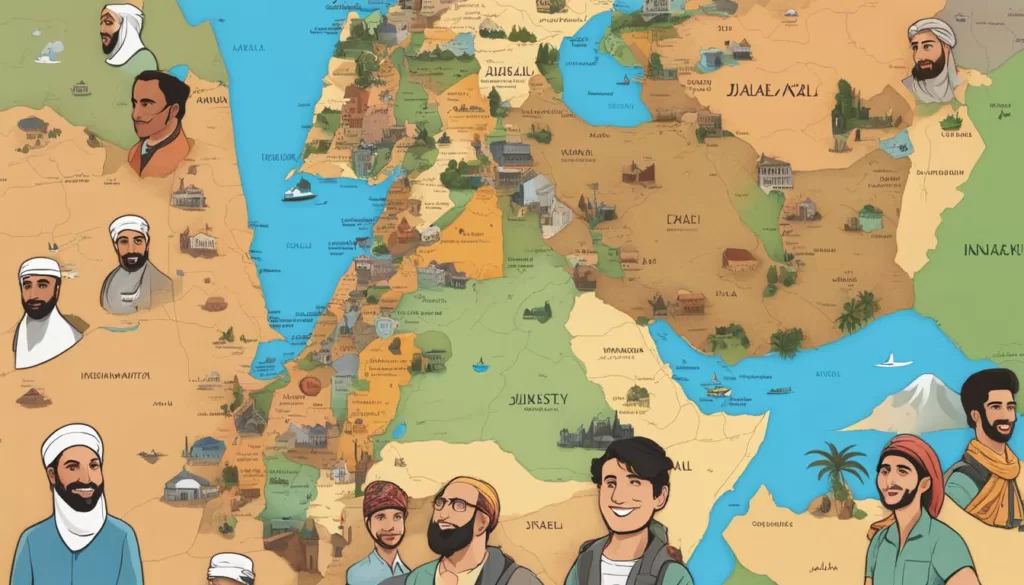
In examining the Arabic dialects found within Israel, one can appreciate the richness that these linguistic variations bring to the nation’s soundscape. Palestinian Arabic, with its unique features and expressions, is predominantly used by many Arab Israelis. Meanwhile, Bedouin Arabic and Druze Arabic echo the distinct social patterns and histories of the Bedouin and Druze populations in the country. These dialects, while bound by a standard written form, showcase remarkable diversity in pronunciation, vocabulary, and usage in everyday conversations.
Despite Arabic’s special status in the nation, underscored by legal recognition, its spoken forms actively live in the personal domains of the speakers. This linguistic variety is not merely a catalogue of sounds but serves as a central marker of identity, pride, and continuity among Arab communities.
Arabic’s numerous dialects are a testament to the resiliency and adaptability of a language that has withstood the test of time and thrives in the modern era.
Beyond the spoken word, the presence of Arabic in Israel is also ceremonially enshrined in the signage across cities and towns, in education, and on broadcasting channels, ensuring the language’s vitality and accessibility. The commitment to accommodating these linguistic variations is evident as they enrich cultural dialogues and contribute significantly to Israel’s linguistic mosaic.
| Dialect | Speaker Community | Features |
|---|---|---|
| Palestinian Arabic | Arab citizens of Israel | Used in daily conversation, media, and education |
| Bedouin Arabic | Bedouin communities | Characterized by distinct phonology and vocabulary |
| Druze Arabic | Druze population | Influenced by the unique social customs of the Druze |
Such an array of Arabic dialects weaves a complex and vibrant linguistic fabric that resonates with the personal stories and experiences of the individual speakers. Embedded in the cultural practices and traditions of Arab communities, Arabic in Israel continues to be a symbol of identity, fellowship, and a bridge across generations.
Exploring the Influence of Minority and Immigrant Languages
As the whispers of Hebrew and the lyrical strains of Arabic amalgamate in the streets of Israel, so do the voices of minority and immigrant communities, each contributing unique notes to the nation’s linguistic symphony. Highlighted among these are the Amharic speakers, the resilient Russian-speaking populace, and the guardians of Yiddish heritage, all of whom embody the multilingual character of Israel.
Amharic, Russian, and Beyond: The Voices of Israel’s Communities
Amharic, the mother tongue of Ethiopian Jews, continues to resonate within the rich fabric of Israeli society. Since the significant waves of Ethiopian immigration in the 1980s, Amharic speakers have carved out a space for themselves, ensuring that their stories form part of the ongoing Israeli narrative. These Ethiopian Jews, with their vibrant Jewish cultural heritage, affirm the country’s commitment to embracing diversity.
Russian, too, adorns the Israeli linguistic mosaic with its resounding presence. The fall of the Iron Curtain saw an influx of immigrants, infusing Israeli life with a robust Russian-speaking demographic. Their influence extends beyond the private sphere into public life, with Russian media taking a prominent place alongside Hebrew and Arabic broadcasts. This is emblematic of Israel’s acknowledgment and integration of its multicultural citizenry.
Preservation of Yiddish and Other Historical Languages
The Yiddish community, predominantly comprising ultra-Orthodox communities, remains a bastion for one of Israel’s most storied historical languages. As a vestige of pre-state Jewish life in Europe, Yiddish continues to be spoken and cherished, preserving a tangible link to a rich diasporic past. Even amidst a continually evolving Israeli society, these historical languages bear witness to the past and contribute to the diverse cultural tapestry through various cultural exchange initiatives.
As Israel marches forward, it is these communities that stand as keepers of tradition, fostering an environment where language and culture coalesce to form a cohesive whole. Whether through schools, public forums, or the arts, the Israeli milieu thrives on the principle of inclusivity, celebrating each linguistic thread that weaves into its social fabric.

Conclusion
The journey through the vibrant spectrum of languages spoken in Israel culminates in a profound appreciation for the nation’s linguistic diversity. This cultural tapestry, rich with the threads of history, illuminates the pluralistic character embedded within Israeli society. Language education, deeply rooted in the fabric of the country, empowers individuals across various ethnicities and backgrounds to contribute to the narrative of a truly multilingual nation.
In every corner of Israel, from the ancient alleyways of Jerusalem to the gleaming high-rises of Tel Aviv, the diverse languages form a dialogue of coexistence and shared identity. Hebrew, Arabic, Russian, English, and a bouquet of other languages are not merely tools of expression—they are the essence of resilience, an anthem of unity in diversity that reverberates across this dynamic society.
Ultimately, the polyphonic harmony of languages spoken in Israel stands as an exemplary testament to the nation’s commitment to fostering a multicultural haven. It’s a symphony where every linguistic note contributes to the collective melody, celebrating every individual’s heritage while composing the single, cohesive story of an inclusive, multilingual nation.
FAQ
What are the official languages of Israel?
Hebrew is the official language of Israel, and Arabic has a special status, ensuring its presence and cultural significance are recognized and preserved within the country’s legal framework.
How prevalent is English usage in Israel?
English is widely spoken in Israel, with a significant portion of the population having some proficiency in the language. It’s commonly used in official signs, business affairs, and is an important part of the educational curriculum.
What role does Russian play in the linguistic landscape of Israel?
Russian holds a vital role due to a substantial Russian-speaking community in Israel. It’s supported by Russian language media and is one of the most common non-official languages spoken in the country.
Are there any other significant languages spoken in Israel besides Hebrew and Arabic?
Yes, in addition to Hebrew and Arabic, many languages are spoken in Israel due to its diverse population, including Russian, English, Amharic (spoken by Ethiopian Jews), Spanish, Yiddish (among ultra-Orthodox Jewish communities), French, and others.
Can you tell me more about the resurrection of Hebrew in Israel?
The revival of Hebrew is a unique and successful aspect of modern Israel’s history. Driven by people like Eliezer Ben-Yehuda and others during the Second Aliyah, the language transformed from a primarily sacred language to the vibrant spoken language of everyday life in Israel.
How has Israel’s history influenced its current language policies?
Israel’s language policies have been shaped by its history, from the decisions taken during the British Mandate era to those resulting from large waves of immigration, especially from the former Soviet Union. The Zionist movement played a significant role in promoting Hebrew as the unifying language for the Jewish state.
Are there schools in Israel that teach predominantly in languages other than Hebrew and Arabic?
While Hebrew and Arabic are prevalent in most schools, there are also educational institutions, programs, and international schools in Israel where languages such as English, French, and Russian are significant mediums of instruction.
How is Israel ensuring the integration of its diverse languages within its society?
Israel encourages the integration of its various languages through educational systems fostering multilingual fluency, policy efforts to accommodate minority languages within public services, and cultural exchange initiatives that promote linguistic diversity.
What is the impact of Arabic’s special status in Israel?
Arabic’s special status in Israel ensures that it receives recognition and is part of the education system, media, and public services, reflecting the cultural heritage of Israel’s Arab citizens.
What languages are covered by cultural exchange initiatives in Israel?
Cultural exchange initiatives in Israel often cover less widely spoken languages such as Amharic, French, Spanish, and Russian, promoting cultural ties and the sharing of linguistic heritage.

